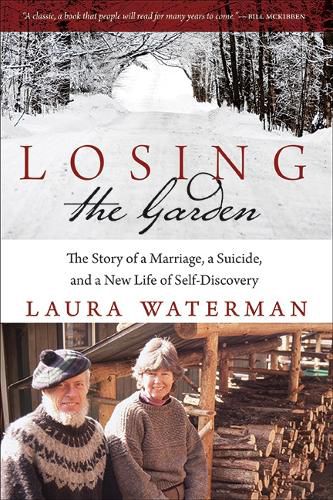Readings Newsletter
Become a Readings Member to make your shopping experience even easier.
Sign in or sign up for free!
You’re not far away from qualifying for FREE standard shipping within Australia
You’ve qualified for FREE standard shipping within Australia
The cart is loading…






This title is printed to order. This book may have been self-published. If so, we cannot guarantee the quality of the content. In the main most books will have gone through the editing process however some may not. We therefore suggest that you be aware of this before ordering this book. If in doubt check either the author or publisher’s details as we are unable to accept any returns unless they are faulty. Please contact us if you have any questions.
A portrait of an intense and unusual marriage, and an affirmation of life after suicide.
In 1971, Laura and Guy Waterman left New York City for thirty-seven acres in Vermont, where they would live in a hand-built cabin without running water or electricity for the next thirty years. It was a life based largely in the nineteenth century, a life of hauling their own water and growing their own food, of lighting candles in the evening and heating their cabin with wood from the surrounding forest. Combined with the trail tending they did in the alpine zone of the White Mountains and the books they wrote about environmental stewardship, it made for a rewarding, healthy, and fruitful existence. But that was only part of their story. Guy's depression was another part, and his ultimate decision to take his own life on the wintry summit of Mount Lafayette-a decision he made with Laura's support-was the crux, a term climbers use to describe the hardest move on the climb. Being a climber herself, Laura had to confront the crux. This meant taking a close look at Guy's suicide and asking herself a hard question: How, or why, had she come to support the decision of the man she loved? In Losing the Garden, Laura Waterman comes to terms with her husband's long depression and the complex nature of a gifted, humorous man who was driven by obsession, self-absorption, and a strange lack of confidence. Her account of her own marriage, idyllic from the outside but riddled from within, is nonetheless a love story, a portrait of an intense and unusual marriage, and an affirmation of life after loss.
$9.00 standard shipping within Australia
FREE standard shipping within Australia for orders over $100.00
Express & International shipping calculated at checkout
This title is printed to order. This book may have been self-published. If so, we cannot guarantee the quality of the content. In the main most books will have gone through the editing process however some may not. We therefore suggest that you be aware of this before ordering this book. If in doubt check either the author or publisher’s details as we are unable to accept any returns unless they are faulty. Please contact us if you have any questions.
A portrait of an intense and unusual marriage, and an affirmation of life after suicide.
In 1971, Laura and Guy Waterman left New York City for thirty-seven acres in Vermont, where they would live in a hand-built cabin without running water or electricity for the next thirty years. It was a life based largely in the nineteenth century, a life of hauling their own water and growing their own food, of lighting candles in the evening and heating their cabin with wood from the surrounding forest. Combined with the trail tending they did in the alpine zone of the White Mountains and the books they wrote about environmental stewardship, it made for a rewarding, healthy, and fruitful existence. But that was only part of their story. Guy's depression was another part, and his ultimate decision to take his own life on the wintry summit of Mount Lafayette-a decision he made with Laura's support-was the crux, a term climbers use to describe the hardest move on the climb. Being a climber herself, Laura had to confront the crux. This meant taking a close look at Guy's suicide and asking herself a hard question: How, or why, had she come to support the decision of the man she loved? In Losing the Garden, Laura Waterman comes to terms with her husband's long depression and the complex nature of a gifted, humorous man who was driven by obsession, self-absorption, and a strange lack of confidence. Her account of her own marriage, idyllic from the outside but riddled from within, is nonetheless a love story, a portrait of an intense and unusual marriage, and an affirmation of life after loss.